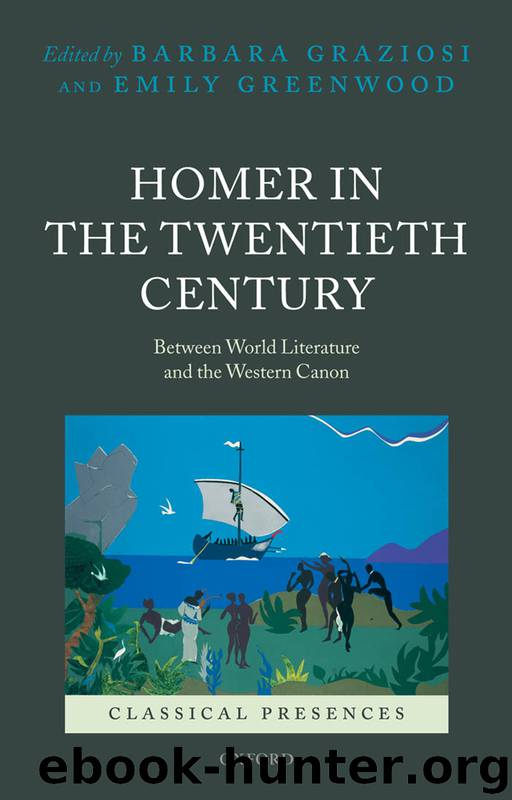Homer in the Twentieth Century by Graziosi Barbara; Greenwood Emily; & Emily Greenwood

Author:Graziosi, Barbara; Greenwood, Emily; & Emily Greenwood
Language: eng
Format: epub
Publisher: Oxford University Press USA - OSO
Published: 2011-03-08T16:00:00+00:00
8
‘Homecomings without Home’: Representations of (Post)colonial nostos (Homecoming) in the Lyric of Aimé Césaire and Derek Walcott
Gregson Davis
The francophone island of Martinique and the predominantly anglophone island of St Lucia are situated in close proximity to each other in the Lesser Antilles—so close, in fact, that fishermen from both islands who come into frequent contact at sea manage to communicate in a French-based ‘patois’ with a minimum of linguistic code-switching. While the fishermen have routinely and cheerfully ignored national boundaries (whether colonial or postcolonial) and have found in the creole language a means of transnational communication, the majority of the inhabitants of these adjacent islands in the archipelago cherish the illusion of radical cultural difference.
Following the lead of the Caribbean fishermen in their disregard for borders both political and cultural, I propose to navigate the thematic waterways that unite four exquisite lyric compositions produced in the region: Cahier d’un retour au pays natal and ‘Spirales’ by the Martinican Aimé Césaire, and ‘Homecoming: Anse La Raye’ and Omeros by the St Lucian Nobel laureate Derek Walcott—a group of compositions that are demonstrably indebted in regard to their cardinal motifs to Homeric archetypes, especially those ultimately derivative of the Odyssey. A comprehensive analysis of major Homeric motifs shared between the two lengthier, more intricate compositions in the ensemble (Césaire’s Cahier d’un retour au pays natal1 and Walcott’s Omeros,) would certainly take us on a journey to realms far beyond the horizons of this chapter. I shall therefore focus my observations on the adaptation of the central Odyssean motif of the hero’s return journey to his island home in the poem of Aimé Césaire, and on Derek Walcott’s parallel refashioning of Homeric antecedents in both the shorter lyric, ‘Homecoming: Anse La Raye’, and in select passages from the long poem, Omeros. A prime aim of my brief exploration of pertinent passages from the works of these two great Caribbean verbal artists will be to clarify the scope of the rhetorical leverage, so to speak, that they are able to obtain through the skilful adaptation of certain fundamental narrative patterns in the tradition of European epic—those patterns that constitute what Walcott has felicitously termed in Omeros, the ‘Homeric shadow’.2
By way of prelude to my discussion I offer a few remarks of a philological nature. I am not planning to engage in the kind of analysis that has come to be labelled ‘intertextual’ in the now vulgar sense (i.e. as a synonym for what used to be called ‘allusion’). Instead, I shall be concentrating on the broader strategies by which certain central Homeric motifs are recodified in contemporary terms. Despite the well-known fact that both Césaire and Walcott received an elite education that included familiarity with the Classical languages, especially Latin, and may therefore well have read such authors as Homer and Virgil in the original languages,3 my critical lens is oriented, not at disclosing subtle echoes and affinities between the Caribbean poems and Homeric texts, but rather at revealing major aspects of thematic resonance with, and remodelling of, time-honoured narrative motifs.
Download
This site does not store any files on its server. We only index and link to content provided by other sites. Please contact the content providers to delete copyright contents if any and email us, we'll remove relevant links or contents immediately.
Letters From a Stoic by Seneca(2670)
The Valmiki Ramayana: Vol. 1 by Bibek Debroy(2353)
The Valmiki Ramayana: Vol. 2 by Bibek Debroy(2202)
The Valmiki Ramayana: Vol. 3 by Bibek Debroy(2066)
Mary Boleyn by Alison Weir(1773)
The Greeks by H. D. F. Kitto(1639)
The Notebooks of Leonardo Da Vinci by Da Vinci Leonardo(1508)
Mythos (2019 Re-Issue) by Stephen Fry(1473)
The Classics by Mary Beard(1435)
The Voynich Manuscript by Gerry Kennedy(1410)
Medea and Other Plays by Euripides(1354)
Annals by Tacitus(1343)
Art of Living by Sellars John;(1342)
Claudius the God by Robert Graves(1228)
Hindoo Holiday by J. R. Ackerley(1221)
Appeasement of Radhika by Muddupalani(1208)
Atlantis the Lost Continent Finally Found by Arysio Santos(1183)
THE REPUBLIC by plato(1174)
Kadambari: Bana by Bana(1173)
